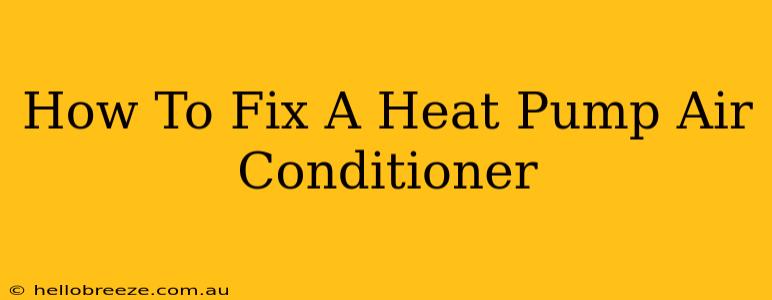Heat pumps are increasingly popular as energy-efficient alternatives to traditional heating and cooling systems. However, like any appliance, they can malfunction. This guide will walk you through common heat pump air conditioner problems and how to troubleshoot them. Remember, for significant issues or if you're uncomfortable working with electrical components, always call a qualified HVAC technician.
Common Heat Pump Air Conditioner Problems & Solutions
This section addresses some of the most frequent issues homeowners face with their heat pump air conditioners. We'll break them down into manageable steps, emphasizing safety first.
1. No Power
- Problem: The unit simply won't turn on.
- Troubleshooting:
- Check the breaker: Is the circuit breaker tripped? Reset it. If it trips again immediately, there's a more serious electrical issue requiring professional attention.
- Inspect the power cord: Look for any damage to the power cord itself. A frayed or damaged cord needs to be replaced by a qualified electrician.
- Examine the thermostat: Ensure the thermostat is set correctly and receiving power. Try replacing the batteries (if applicable).
- Test the power at the unit: If you're comfortable working with electricity (and have switched off the power at the breaker!), use a non-contact voltage tester to verify power is reaching the unit's connection point.
2. Insufficient Cooling or Heating
- Problem: The unit is running but not effectively cooling or heating your space.
- Troubleshooting:
- Check the air filter: A dirty air filter restricts airflow, significantly impacting performance. Clean or replace the filter.
- Inspect the condenser coils (outdoor unit): Clean the condenser coils with a coil cleaner to remove dirt and debris that impede heat transfer. Never use a high-pressure water jet.
- Examine the evaporator coils (indoor unit): Similar to the condenser coils, clean these if visibly dirty.
- Verify refrigerant levels: This requires specialized equipment and knowledge. Low refrigerant levels often indicate a leak, requiring professional repair. Do not attempt to add refrigerant yourself.
- Check blower motor: Ensure the blower motor is running correctly. A weak or faulty blower motor will limit airflow.
3. Freezing Up
- Problem: Ice forms on the evaporator coil (indoor unit).
- Troubleshooting:
- Check the air filter: A clogged filter drastically reduces airflow, leading to freezing.
- Inspect the defrost cycle: Heat pumps have a defrost cycle to melt ice buildup. If this cycle isn't functioning correctly, ice accumulation can occur. This problem usually requires professional diagnosis.
- Check for restricted airflow: Ensure there are no obstructions blocking airflow to or from the unit.
4. Unusual Noises
- Problem: The unit is making strange noises, such as squealing, rattling, or grinding.
- Troubleshooting:
- Identify the source: Try to pinpoint where the noise is coming from.
- Check fan blades: Inspect the fan blades for any damage or debris.
- Loose components: Listen for loose screws or components that may be rattling.
- Motor bearings: Worn-out motor bearings often produce squealing noises. This usually requires professional repair or replacement.
Preventative Maintenance for Your Heat Pump
Regular maintenance can significantly extend the lifespan of your heat pump and prevent costly repairs. Consider these steps:
- Change air filters regularly: Aim to change your air filter every 1-3 months, or more frequently if you have pets or allergies.
- Clean condenser coils: At least once a year, clean the condenser coils (outdoor unit) to remove debris.
- Schedule professional maintenance: Annual inspections by a qualified HVAC technician can identify potential problems before they become major issues.
Disclaimer: This guide offers basic troubleshooting tips. For complex problems or if you are unsure about any repair, always consult a qualified HVAC professional. Improper repairs can void warranties and potentially cause further damage or injury. Safety should always be your primary concern.

